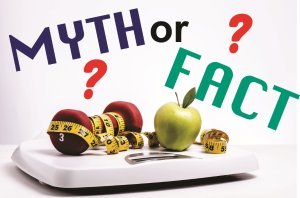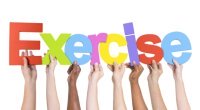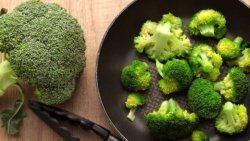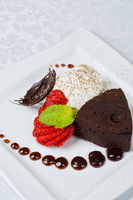Weight Loss Myths

Learning about weight loss myths, and how to lose weight effectively, is sometimes like going through a maze. With all the thousands of websites and information on dieting, it's hard to determine fact from fiction. Due to the information overload on losing weight and getting healthy it can get very confusing.
You are not alone with the confusion.
So, here are 10 myths about weight loss to help you sift through the facts and fiction. #1 You Dont Have to Count Calories
Featured Articles
While this weight loss myth does have some truth to it, the fact is that losing weight is all about calorie consumption and calorie expenditure. If you take in more calories than you expend, you will gain.
But if you expend more calories than you take in, you will lose weight. When determining how active you need to be in order to expend those calories, remember your Basil metabolic rate (BMR) is working even when you’re not active.
So it doesn’t mean that if you eat 1,000 calories you must run, jog or walk to burn the full 1000 calories. Just make sure you’re burning more calories in the day than you take in. Here's an article to help you cut calories and lose weight.
Some programs will "count" carbohydrates, or points or fats. Since calories are made up of various macro nutrients, in essence they are still counting calories to some degree.
So why don't these programs just count calories? Even though losing weight is about burning more calories than consumed, not all calories are created equal.
Different types foods will go through different metabolic pathways. This means they can have different results on your hunger and the hormones that regulate your body weight.
Foods that are higher in fats and carbohydrates can tend to make you feel hungry and therefore can lead to eating more than your allotted calorie intake for the day.
Whereas foods higher in protein can make you feel more full longer and keep your hunger at bay.
#2 Avoid Carbrohydrates
This weight loss myth has many people skipping their daily required carbohydrates. Even though low carb diets can aid to weight loss, this does not mean carbs cause weight gain. According to the USDA "MyPlate" your portion of carbs should be about 1/4 of your plate. Like in the first myth about weight loss, it’s not the carbs that will make you fat, it’s all about calorie intake and expenditure.
While skipping carbs to get fast weight loss has worked for many people, once they stop "dieting" the weight can combe back on quickly. Instead of skipping the carbs, you want to choose the right carbs. Whole foods that are high in carbs are very healthy. It's the refined carbs like refined grains and sugars you want to minimize or avoid.
Some foods are more dense in calories, like refined carbs and fatty foods so they will have more calories per ounce – so use in moderation (but remember, don’t eliminate all fat – you need some (see myth #3)
In fact, starchy foods such as potatoes, breads and pasta are some of the fastest burning foods and provide the body with ready to use fuel. Experts recommend that your diet includes these types of foods for fuel and should make up approximately 60% of your calorie intake. Be sure to make your bread and pasta’s whole wheat as this will provide a higher nutrient intake than white or processed flour foods.#5 Don't Diet.... Just Exercise

Well if you’ve already read my exercise myths, then this will feel like dejavu. The fact of the matter is, you cannot just exercise and achieve the results you’re looking for.
You must monitor both the food intake and your activity level to be successful. Remember, you want to consume fewer calories than you burn, so you have to know what the consumption is versus the exenditures.
While just focusing on exercise may get you this calorie deficit, you have to track both food and exercise calories to ensure you are going to lose weight.
#6 Don't Snack Between Meals
This myth might be due to interpretation of "snacking". If you are munching on potato chips, snacking on chocolate candies or grabbing a hot fudge sundae between meals, then the above statement would be true and not a myth.
However, if your snacking is really just another small healthy meal, then the above statement would be a myth. Experts are now saying the best method is to eat smaller meals more often. You should aim for eating 5 or 6 times a day of healthy foods such as fruits, veggies, lean meats, etc.
Eating smaller, healthier meals more often is a great metabolism booster. By eating more often, in smaller portions, you are keeping your metabolism active. Additionally, you reduce the risk of getting “cravings” because you are not letting yourself get too hungry and therefore you won’t feel the need to binge.
So go ahead and snack between meals but choose the healthier options and avoid the foods high in fats and sugars.
#7 The Lower the Calories, the Faster I will Lose

Of all the weight loss myths, this is the one I feel is the most important to really understand. Although basic weight loss is about calories in and calories out, be careful not to go too low on the calorie intake.
Your body’s natural instincts will take over, putting you into “starvation mode”. When this happens, your body will start to store the fat for future potential fuel and your metabolism will slow down to conserve the body’s energy.
This means you will be burning fewer calories through normal body functions that if you ate a normal, but moderate meal.
So don't starve yourself thinking this will get you a quick weight loss. Instead, make sure your calorie intake is at a healthy level to lose weight and keep your metabolism working.
#8 Don't Eat Late
Although many people believe this to be a weight loss tip, it is actually found more often in weight loss myths. Remember, it’s all about calories in and out. So, if your late night (healthy) snack doesn’t put you over your calorie intake, then it shouldn't affect your weight loss.
But beware, a lot of late night snacking can be a “binge” eating because you’ve been craving something all week or day. If this is why you are snacking, just make sure it’s in moderation.
Of course, if you are eating right before you climb into bed and your body is at rest, your metabolism is slower and burning fewer calories. Therefore, these calories may not have a chance to be burned away with your daily activities.
So this myth does have some common sense and is not a bad rule to follow. So try avoiding eating right before bed. Try to get in your snack at least an hour before bed. And remember, what you eat is more important than when you eat.
#9 I Can Eat All The Negative Calories Foods I Want
While the above statement is fairly accurate, the reason this is listed in the weight loss myths is to clarify that no foods have negative calories. Negative calorie foods are those foods that require more energy to digest than the amount of energy in the item itself.
So the net effect would be that you burn more calories than you consumed with these negative calorie foods. While these foods, such as celery, apples, pickles, grapefruit, berries and more are healthy choices, they do come with some calorie content.

Given that these foods require more energy to digest than what is consumed, you would be safe in eating as much as you like. However, still track the total calories consumed and calories burned to ensure you lose weight.
Another myth to understand is about fat free and sugar free foods. While some people believe that fat free or sugar free means calorie free, this is not always the case.
While there are some food items, such as diet soda, that have zero calories, they also do not offer any nutritional value. You want to focus on foods that provide nutritional value while staying within your calorie intake allowance for weight loss.
#10 Fad Diets Work
In fact they do, for a short time. Read your goals again – is your goal just a short term weight loss, only to put the pounds back on? Probably not. What you are looking for is that lifelong weight loss. Once you’ve lost that weight, you want to keep it off.
There are some extremely low carb or low calorie diets that do have a good success rate like the Atkins Diet, Medifast and Keto diets. But if a diet claims that by eating all the bananas you want and not worry out anything else, it's probably a fad diet that is doomed to fail.
Just make sure you have a good maintenance plan so that it can become an eating style you can live with. Remember, it’s a lifestyle change – no a short term weight loss.
If you enjoyed reading these weight loss myths then check out these exercise myths for seniors.
Additional Articles
Reduce Fat Through Cooking Methods
Reduce the fats in your foods with various cooking methods. Try these methods out for your next meal.
Exercise Myths
Be sure to understand the myths about exercise as well to make the most from your exercise routines.
Quick Weight Loss Tips
Try these healthy tips to lose weight faster.




